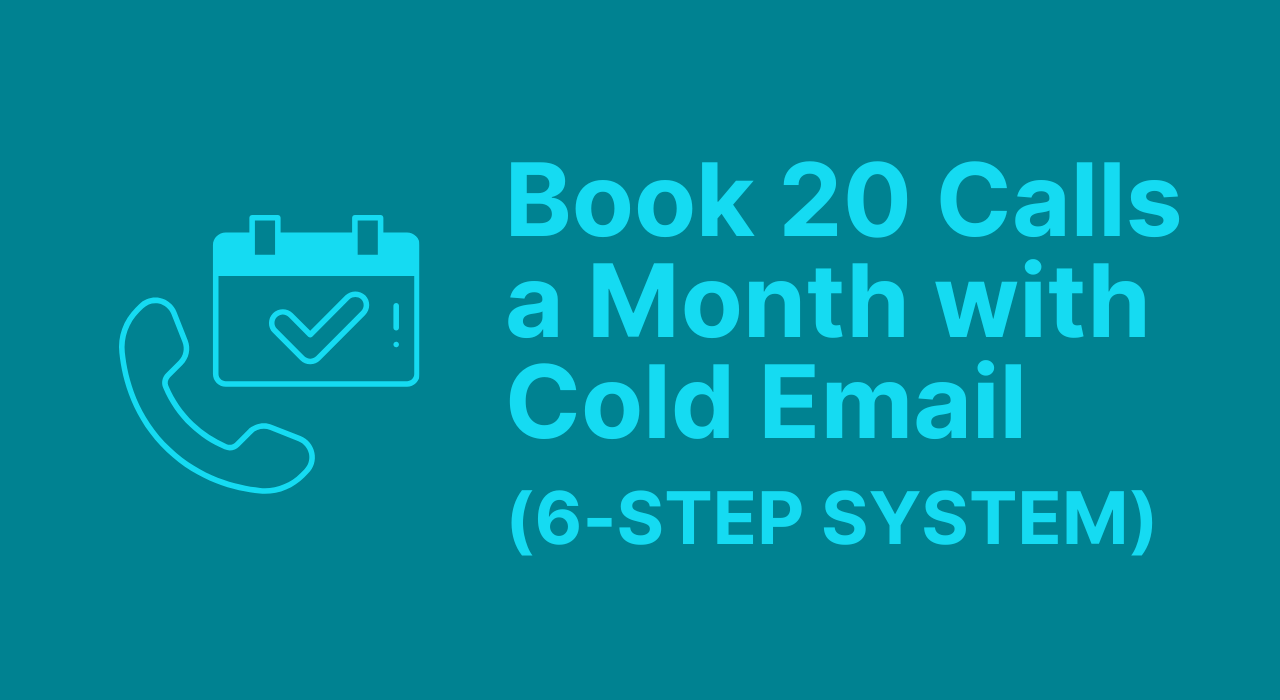- Retain Digital
- Posts
- Book 20 Calls a Month with Cold Email: A Simple 6-Step System
Book 20 Calls a Month with Cold Email: A Simple 6-Step System
How to fill your calendar without expensive ads or waiting for referrals

Tired of Empty Calendars and Expensive Ads?
Imagine booking 20 calls every month with perfect-fit clients.
No paid ads. No begging for referrals. Just a simple email strategy that puts you in control of your pipeline.
Sound too good to be true? It's not. You can transform your sales approach using this exact system.
Why Cold Email Works Better Than Ever in 2025
Despite what you might have heard, cold email isn't dead. In fact, it's thriving for businesses like yours.
According to Litmus research, email marketing delivers an average ROI of $36 for every $1 spent, making it one of the most cost-effective outreach methods available to you.
But there's a right way and a wrong way to do it.
Prerequisites: Start With The End In Mind
Before diving into the process, you need four key elements in place:
1. Know Your Ideal Customer Profile
Who exactly are you targeting? Get specific about:
Their industry and company size
Their role and decision-making power
The problems they face daily
What solutions they've already tried
As HubSpot's research shows, when you send targeted emails, you'll generate 18% more revenue than with broadcast emails.
2. Have a Cold Email Strategy
Don't just wing it. Plan your approach:
How many people will you contact?
How often will you follow up?
What metrics will you track?
How will you improve over time?
3. Create an Irresistible Offer
Your offer needs to be so good prospects would feel silly saying no. The best offers you can create:
Solve a specific, painful problem
Promise clear, measurable results
Remove risk with guarantees
Feel exclusive or limited
4. Build a Sales Process
Know exactly what happens after someone responds:
How quickly will you reply?
What questions will you ask?
How will you schedule the call?
What will you cover during the call?
The 6-Step Cold Email System
Now for the practical steps that will fill your calendar:
1. Register Non-Primary Domains
Start fresh with domains dedicated to your cold email campaigns.
This protects your main business domain's reputation and gives you more flexibility.
According to EmailTooltester, when you use separate domains for cold outreach, you can improve deliverability by up to 23%.
Pro tip: Keep these domains related to your business, but different from your main website.
2. Create 2 Mailboxes Per Domain
For each domain, set up two separate email accounts.
This gives you backup options if one encounters issues and lets you test different approaches simultaneously.
Make these professional and simple:
3. Point Mailboxes to a Cold Email Platform & Warm Them Up
Connect your new mailboxes to a dedicated cold email tool like:
Then warm up these mailboxes before sending any campaigns.
Start by sending a few emails daily to people you know, then gradually increase volume over 2-3 weeks.
Mailshake research shows that when you properly warm email accounts, you'll see up to 38% higher inbox placement rates than with cold accounts.
4. Write a 3-Part Cold Email Sequence
Don't just send one email and hope for the best. Create a sequence of three emails:
Email 1: Introduction
Short, friendly intro (2-3 sentences)
Clear value proposition
Simple question to start conversation
Email 2: Follow-Up (Send 3 days later)
Gentle reminder
New piece of value or insight
Different angle on how you can help
Email 3: Final Outreach (Send 5 days after Email 2)
Create slight urgency
Offer specific times for a call
Make it easy to say yes
Follow-up emails increase response rates by an average of 22% compared to single-send campaigns," according to Salesloft's benchmark report. You'll see this improvement when you implement a proper sequence.
5. Gather Your Lead List
Build a targeted list of prospects who match your ideal customer profile.
Quality beats quantity every time. A list of 100 perfect-fit prospects will outperform a generic list of 1,000 people.
Resources for building your list:
6. Launch and Optimize
Start sending your campaigns and track every metric:
Open rates
Reply rates
Meeting booking rates
Conversion to customers
Then continuously improve:
Test different subject lines
Adjust your messaging based on responses
Update your targeting based on who engages most
Refine your offer based on feedback
According to Campaign Monitor, when you regularly test your email campaigns, you'll see up to 37% higher conversion rates.
Real Results You Can Expect
When implemented correctly, this system works remarkably well for businesses like yours.
Outreach.io's research found that with consistent, well-executed cold email campaigns, you can achieve:
15-25% open rates
5-15% response rates
1-3% meeting booking rates
For your targeted list of 1,000 prospects, that's 10-30 meetings per month.
Common Mistakes You Should Avoid
Don't fall into these traps:
Sending too many emails too fast When you start slow and build up, you'll protect your sender reputation. Sending 100 emails on day one will land you in the spam folder.
Making it all about you Your emails should focus 80% on the prospect's problems and only 20% on your solution. When you put their needs first, they'll respond better.
Giving up too soon According to Sales Hacker, the average successful cold email campaign requires 8+ touches before getting a response. Your persistence will pay off.
Your Next Steps
Cold email isn't complicated, but it does require you to follow a system.
Start with the prerequisites, follow the six steps, and be patient with the process. You'll soon see your calendar filling up with qualified prospects eager to talk.
Here's what to do today:
Define your ideal customer profile
Register your first non-primary domain
Set up two mailboxes
Choose your cold email platform
Want to learn more? Check out these resources: